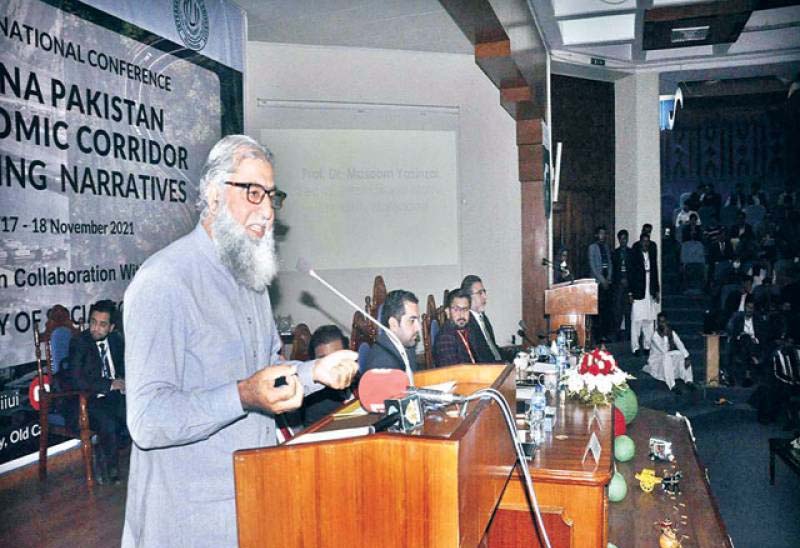Eminent experts call for promoting gigantic CPEC

Islamabad: Eminent national and international experts in economics and sociology have called for promoting the gigantic China-Pakistan Economic Corridor (CPEC).
Speaking at a two-day international conference on ‘China-Pakistan Economic Corridor Building Narratives,’ they called for more efforts to promote CPEC as Pakistan’s “national project.”
The conference was organized by Iqbal International Institute for Research and Dialogue (IRD), of International Islamic University (IIU) in collaboration with Faculty of Social Sciences commenced at Quaid-e-Azam Auditorium, Faisal Mosque Campus, Islamabad. The conference was attended by eminent national and international experts in economics, sociology and mass media.
In different sessions of the conference, around 50 national and international experts, researchers, academicians and intellectuals will discuss various aspects of CPEC’s regional and global impact.
Speaking at the inaugural ceremony in his presidential address, IIU Rector Professor Dr Masoom Yasinzai underscored the importance of the universities in solution of the problems and challenges of society.
He stressed that debates on the vital topics that have the game changing importance such as CPEC must be openly conducted on the constructive platforms and universities must lead this initiative.
Dr Masoom Yasinzai hinted towards meaningful presence of the Youth in Pakistani society, and expressed that the Pakistani human resource compliant to the CPEC needs, with mutual agreement between both states, must be produced to be benefited from the opportunity. He also hailed IRD for arranging an important international conference.
Rafi ullah Kakar, Director, Strategic Planning and reforms cell, Government of Balochistan, in his keynote address discussed misconceptions and myths about the CPEC.
In addition, he also explained an overview of the project with the perspective of both countries. He enlightened on potential risks and ground realities with the example of statistical approach.
He opined that there was a dire need to realize that CPEC was not a substitute to local development policies and it is imperative to solve the indigenous issues with indigenous approach.
He also said that there must be extensive homework and evaluation of national interest be done throughout the project for the multifaceted and successful results.
Professor Dr Ahmed Shuja Syed, Vice President, Research and Enterprise discussed in his lecture about the human resource development perspective of the CPEC.
He stressed to focus on key target areas and sectors related to CPEC such as supply chain, engineering, trained man power, logistics and railways.
He said that academia must come forward to address the gap and Pakistani universities across the must focus on the pointed out aspects in terms of capacity building, training and research as well.
Professor Dr Zafar Iqbal, Dean of the faculty of Social Sciences urged for more research adding that presence of ample research literature would help in building the counter narratives. He referred to the malign narratives being disseminated by west in pursuit of negative propaganda against CPEC.
He pointed out optimized and simplified versions of propaganda against CPEC and called for establishment of research centers and think tanks to evaluate the hyped propaganda and build a true narrative based on facts.
In his Welcome address, explaining aims and objectives of the conference, Dr Husn ul-Amin, Executive Director, IRD remarked that CPEC was an important project aimed at extending the western part of China to the southern Arabian Sea.
Many sub-projects of energy, infrastructure, railways and other industries are being implemented and CPEC has entered into the second phase, he added.
He emphasised that there was a need to discuss multifaceted issues of CPEC. He said that it’s the academia’s part that it must build a balanced and factual narrative on this importance topic. He also elaborated about the role and activities of IRD in promoting research and dialogue.





